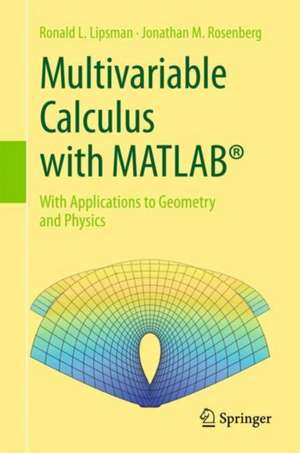Multivariable Calculus with MATLAB®: With Applications to Geometry and Physics
Autor Ronald L. Lipsman, Jonathan M. Rosenbergen Limba Engleză Hardback – 18 dec 2017
MATLAB® is tightly integrated into every portion of this book, and its graphical capabilities are used to present vibrant pictures of curves and surfaces. Readers benefit from the deep connections made between mathematics and science while learning more about the intrinsic geometry of curves and surfaces. With serious yet elementary explanation of various numerical algorithms, this textbook enlivens the teaching of multivariable calculus and mathematical methods courses for scientists and engineers.
| Toate formatele și edițiile | Preț | Express |
|---|---|---|
| Paperback (1) | 358.79 lei 38-44 zile | |
| Springer International Publishing – 31 aug 2018 | 358.79 lei 38-44 zile | |
| Hardback (1) | 303.39 lei 3-5 săpt. | +32.52 lei 4-10 zile |
| Springer International Publishing – 18 dec 2017 | 303.39 lei 3-5 săpt. | +32.52 lei 4-10 zile |
Preț: 303.39 lei
Nou
Puncte Express: 455
Preț estimativ în valută:
58.06€ • 60.39$ • 47.93£
58.06€ • 60.39$ • 47.93£
Carte disponibilă
Livrare economică 25 martie-08 aprilie
Livrare express 08-14 martie pentru 42.51 lei
Preluare comenzi: 021 569.72.76
Specificații
ISBN-13: 9783319650692
ISBN-10: 3319650696
Pagini: 277
Ilustrații: XII, 276 p. 87 illus., 86 illus. in color.
Dimensiuni: 155 x 235 x 25 mm
Greutate: 0.62 kg
Ediția:1st ed. 2017
Editura: Springer International Publishing
Colecția Springer
Locul publicării:Cham, Switzerland
ISBN-10: 3319650696
Pagini: 277
Ilustrații: XII, 276 p. 87 illus., 86 illus. in color.
Dimensiuni: 155 x 235 x 25 mm
Greutate: 0.62 kg
Ediția:1st ed. 2017
Editura: Springer International Publishing
Colecția Springer
Locul publicării:Cham, Switzerland
Cuprins
1. Introduction.- 2. Vectors and Graphics.- 3. Geometry of Curves.- 4. Kinematics.- 5. Directional Derivatives.- 6. Geometry of Surfaces.- 7. Optimization in Several Variables.- 8. Multiple Integrals.- 9. Multidimensional Calculus.- 10. Physical Applications of Vector Calculus.- 11. MATLAB Tips.- Sample Solutions.- Index.
Recenzii
“The book is addressed to students as well as to instructors of calculus. It helps to understand multivariable analysis utilysing visualization of such geometric structures like domains, curves and surfaces. It also develops the skill of students to use a powerful software for solving modern problems.” (Ivan Podvigin, zbMATH 1400.26001, 2019)
Notă biografică
Ronald Lipsman retired in 2010 after a 41-year career as Professor of Mathematics at the University of Maryland. During his last decade on campus, he served as Senior Associate Dean of the College of Computer, Mathematical and Physical Sciences. His research interests include group representations and harmonic analysis on Lie groups. He received his Ph.D. from MIT in 1967 and was a Gibbs Instructor at Yale University, 1967-1969.
Jonathan Rosenberg is Ruth M. Davis Professor of Mathematics at the University of Maryland, a Fellow of the American Mathematical Society, and a Managing Editor of Annals of K-Theory. His research interests include geometry, topology, and mathematical physics. He received his Ph.D. from the University of California, Berkeley, in 1976, and joined the faculty at Maryland in 1981.
Professors Lipsman and Rosenberg have collaborated on numerous research and educational projects. Among their educational texts is: A Guide to MATLAB, 3rd&n
bsp;ed, 2014.
Jonathan Rosenberg is Ruth M. Davis Professor of Mathematics at the University of Maryland, a Fellow of the American Mathematical Society, and a Managing Editor of Annals of K-Theory. His research interests include geometry, topology, and mathematical physics. He received his Ph.D. from the University of California, Berkeley, in 1976, and joined the faculty at Maryland in 1981.
Professors Lipsman and Rosenberg have collaborated on numerous research and educational projects. Among their educational texts is: A Guide to MATLAB, 3rd&n
bsp;ed, 2014.
Textul de pe ultima copertă
This comprehensive treatment of multivariable calculus focuses on the numerous tools that MATLAB® brings to the subject, as it presents introductions to geometry, mathematical physics, and kinematics. Covering simple calculations with MATLAB®, relevant plots, integration, and optimization, the numerous problem sets encourage practice with newly learned skills that cultivate the reader’s understanding of the material. Significant examples illustrate each topic, and fundamental physical applications such as Kepler’s Law, electromagnetism, fluid flow, and energy estimation are brought to prominent position. Perfect for use as a supplement to any standard multivariable calculus text, a “mathematical methods in physics or engineering” class, for independent study, or even as the class text in an “honors” multivariable calculus course, this textbook will appeal to mathematics, engineering, and physical science students.
MATLAB® is tightly integrated into every portion of this book,and its graphical capabilities are used to present vibrant pictures of curves and surfaces. Readers benefit from the deep connections made between mathematics and science while learning more about the intrinsic geometry of curves and surfaces. With serious yet elementary explanation of various numerical algorithms, this textbook enlivens the teaching of multivariable calculus and mathematical methods courses for scientists and engineers.
MATLAB® is tightly integrated into every portion of this book,and its graphical capabilities are used to present vibrant pictures of curves and surfaces. Readers benefit from the deep connections made between mathematics and science while learning more about the intrinsic geometry of curves and surfaces. With serious yet elementary explanation of various numerical algorithms, this textbook enlivens the teaching of multivariable calculus and mathematical methods courses for scientists and engineers.
Caracteristici
Pays considerable attention to visualization and graphics Provides non-routine problem sets that are fundamental to the reader’s understanding of the material Exposes readers to a holistic approach that embraces algebraic/calculus-based solutions and numerical, graphical/geometric, and qualitative approaches Includes supplementary material: sn.pub/extras
